Table of Contents
What Are AI Movies?
Narratives focusing on artificial intelligence have been used repeatedly in books, films and TV throughout the 20th Century. Most conventionally, AI movies present artificial intelligence as villainous and alien-like robots that are determined to control and/or destroy humanity.
But AI is much more complex and interesting than as a merely villainous presence. And there is a wide variety of representation of AI in movies that proves this.
Artificial Intelligence: The theory and development of computer systems able to perform tasks normally requiring human intelligence, such as visual perception, speech recognition, decision-making, and translation between languages.
The Oxford Dictionary of English
We have taken a look at some of the best examples of AI in movies and their different representations. In addition, once we have done so, we will also discuss the best ways into crafting an AI character in your screenplay.
Top Ten Best AI Movies
10. Ghost in the Shell (1995)
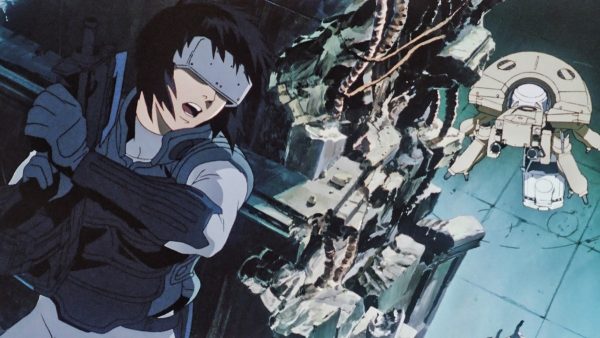
Let’s start off with Ghost in the Shell (1995). This cyberpunk anime takes place in a futuristic world in the year 2029.
The movie follows Major Motoko Kusanagi – a highly advanced cyborg officer who is tracking the Puppet Master. The Puppet Master is a cybercriminal who hacks into people’s ghosts (souls) in order to commit crimes, obtain information and recreate their memories.
- The main protagonist is an AI character. This instantly allows us to have an insight into the mind of artificial intelligence. Here we can see what the similarities and differences are between humans and AI.
- Similarly, through this point-of-view, we are also able to empathise with the AI characters. This differs from the typical trope of fearing and being naturally against the AI characters.
Ghost in the Shell provides a contrasting representation to that typically associated with AI. This representation is most obvious when looking at the setting.
For example, the movie is set in a time where cyborgs and humans are mixed and cohabitating. The story doesn’t instantly choose to make the AI the enemies.
Instead, the movie creates a naturalistic setting where the AI characters are like humans – there are some that are good and there are some that are bad. The story is as much about the messy complexities of this cohabitation as it is about anything else.
Ghost in the Shell is an AI movie that doesn’t separate humans and AI into distinct categories and instead, explores the boundaries between the two. By doing this, it’s able to probe essential questions about what it means to be human. It presents a proximity to technology that reveals the essence and absurdity of human nature and society.
9. Westworld (1973)
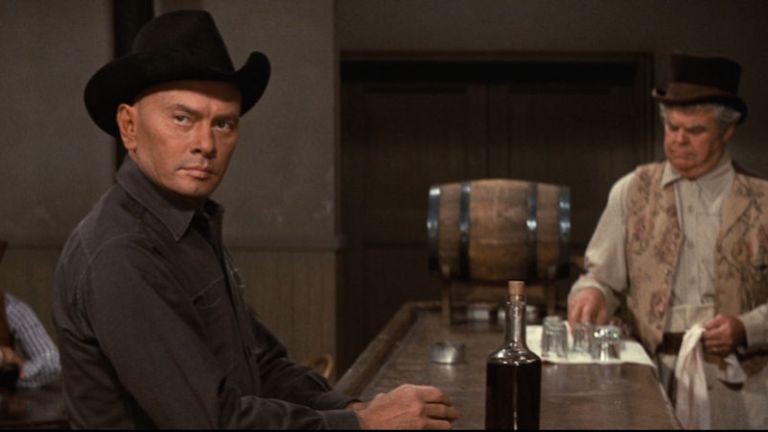
Now, when discussing Westworld, you may be more familiar with the 2016 HBO hit series starring Evan Rachel Wood, Ed Harris and Thandie Newton. However, we want to divert your attention back to the original 1973 movie.
The movie follows John and Peter, who vacate in an expensive and adult theme park populated by robots. However, the characters arrive at a very unfortunate time – the life-like robots have developed sentience and they start rebelling against their programming.
The movie is a great example of an AI movie disguised within the confines of other genres:
- This is most notable due to the theme park being a hyper-realistic theme park called ‘Westworld’, set in the old American West.
- However, the movie also does well to explore a variety of Western tropes. For example, there are shootouts, bar brawls, saloons and gunslingers.
- As a whole, the movie serves as a great example of a genre hybrid– the blending of two or more elements from different genres. It combines a mix of the Western, thriller, action and sci-fi.
As a whole, Westworld follows quite conventional fears surrounding AI.
- For example, the AI robots in Westworld murderously rebel against their creators. This links closely to the general fear that AI will take over and rebel against humanity.
- Through this representation, the movie perfectly addresses the potential implications of creating AI.
- However, through AI, the film also shines a light on the human impulse for fantasy and the desire to play god, within the context of the fake Western world.
Overall, this Western thriller shows the implications of manipulating technology for the benefit of commerce and entertainment. The film doesn’t necessarily critique AI itself but human’s potential utilization of it within a capitalist society.
8. Wall-E
Wall-E is a great contrast to Westworld’s violent killer AI robots. However, the world this dystopian movie depicts is perhaps no less frightening. Wall-E primarily follows a lonely waste-collecting robot that falls in love with another robot.
This portrayal of AI is interesting:
- For one, the movie is a Disney animation. Already this sets up the AI character as cute and likeable.
- Moreover, through Wall-E being the main protagonist, we are able to sympathise with him.
- In doing so, the alien feeling often associated with AI characters is disregarded.
- Instead, we are able to sympathise with Wall-E, especially due to his human-like behaviour and actions.
- Wall-E can’t even talk but his characteristics and mannerisms feel distinctly human, even more so than the humans actually depicted within the film, who largely seem to behave in ways that feel alien to us.
Another great aspect is that Wall-E tells a story where AI saves humanity rather than destroys it. This is interesting, as it shows a sense of dependency on AI and a sentience that deviates from the typical destructive AI representations.
Wall-E serves as an AI movie that does well to combat fears of AI potentially destroying humanity. Instead, the movie humanizes the AI character and makes them the hero of a dying world, a world which was, in fact, destroyed by humans.
7. A.I. Artificial Intelligence
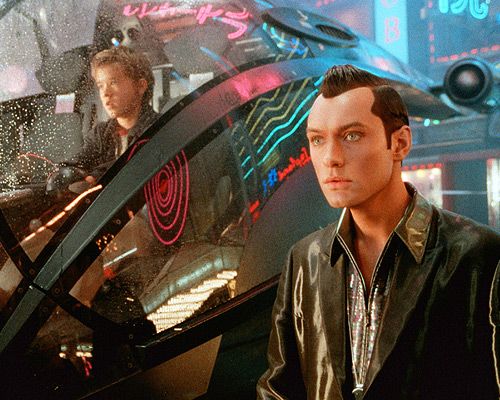
Steven Spielberg’s A.I. Artificial Intelligence is another example of a chilling AI movie.
In this movie, David (who is a high functioning robot) is adopted as a temporary substitute for Monica, a grieving mother whose biological son is in a comatose state. For the time being, David fills the gap. However, when Monica’s son comes out of his coma, things change for David.
A.I. Artificial Intelligence tells a tragic story of an AI robot who just wants to be loved. However, the only way he sees he can do that is by finding out how he can become a ‘real boy’.
Already, we can see a big difference between this and the former representations of AI.
- David is not a cold-hearted killer, nor is he a skilled AI police officer.
- Instead, this movie’s representation of AI is closer to Wall-E. David is an innocent child with the very human desire to be loved.
- However, this movie is also a dark, Pinocchio-esque tragedy, which contrasts highly with Wall-E’s uplifting, more family-friendly themes, for example.
Overall, A.I. Artificial Intelligence is a disturbing AI movie, telling a tragic story of a robot’s search to become human.
It explores the profound gap between AI and humanity by demonstrating both sides – a human that seeks to replace the pain of a lost child with AI and an AI robot that seeks to become human. Both sides feel trapped by their form and the bridge between the two remains elusive.
6. Her
Her is a movie that deviates from the norm in terms of AI movies. It does so by following a more conventional narrative associated with another genre, romance. The movie is set in a near-future world and follows Theodore, a lonely man that falls in love with an AI system.
The movie is credible for many reasons:
- First and foremost, the movie does well to use AI in order to explore love. We delve into what love really is and what it means through an atypical relationship.
- Moreover, the movie perfectly inhabits a realistic, but ultimately doomed love story. It opens with Theodore at the peak of his divorce, desperate to be loved and for a sense of escapism.
- Fortunately, Samantha- the AI operating system- provides him with just that.
Moreover, it is interesting that the movie does not use a physical representation of an AI character:
- Samantha is merely an operating system. Theodore builds a relationship and falls in love with her, but this is mainly reliant on her voice.
- Writer-director Spike Jonze does well to humanize her character, despite her being merely an AI voice. It doesn’t matter that we don’t see her, she feels a fully fleshed-out character.
- Samantha has a personality with flaws. Moreover, her goals feel hard to discern. It feels clear that she loves Theodore. However, deep down we know this is not her purpose. And this is proved right when she disappears without much notice at the end of the movie.
Overall, Her is an AI movie that presents humans’ vulnerability. It explores this in the context of humans’ rising dependency on AI. Whilst it also explores the essential vulnerability that being in love can bring, regardless of who it’s with.
5. Minority Report

Steven Spielberg’s AI movie, Minority Report, follows John (Tom Cruise), a law enforcement officer, who is accused of a murder that he will commit in the future.
The story plays with an at once fun and deeply disturbing concept – a world in which technology has become so powerful, someone can become convicted of a crime before they even commit it.
In Minority Report, AI is represented through the Precogs (Precognitives) – the twins that possess psychic abilities. The Precogs see murders before they take place, allowing law enforcement to track crime before it is committed.
- This is quite a contrasting representation in comparison to most AI movies.
- Instead of physical cyborg-like AI robots, Minority Report explores AI through the use of humans. The Precogs’ abilities are translated through the use of AI in order to provide information for law enforcement.
- Therefore, instead of having AI as the main characters – whether that be as a protagonist or antagonist- Spielberg uses AI as a mere basis that kickstarts the narrative rather than a sole focus.
Once again, this is an AI movie that critiques the society birthing the technology more than it does the AI itself. It’s not the AI that is the most devastating problem, it’s a society that seeks to assert control at all costs.
4. Blade Runner
Blade Runner serves as a great exploration of artificial intelligence through the use of an action thriller narrative.
The story follows Deckard (Harrison Ford), a cop who is given the job to hunt down criminal humanoids known as ‘replicants’. Initially, the replicants are portrayed as dangerous and rebellious humanoids.
However, as the story progresses, there becomes an uncertainty regarding the replicants.
- Are they really as evil as they are made out to be?
- This is particularly notable through Roy’s character (played by Rutger Hauer).
- For example, at the end of the movie, Roy chooses to save Deckard. This instantly demonstrates Roy as having humanistic qualities, despite being a replicant.
- In doing so, it shows a reversed role within the movie. For example, throughout the story, Deckard’s main goal is to find and destroy the replicants.
- However, in doing so, he becomes more robotic than the replicants themselves.
Blade Runner becomes more unsettling the more ambiguous it becomes in regards to Deckard’s identity. Is he a human or a replicant? We never quite know for sure.
Again then, this is an AI movie that challenges the audience to distinguish the lines between humans and AI. By blurring the lines, the movie encourages the audience to interrogate their own humanity and morality, rather than simply falling into a black and white narrative as to who is good and who is bad.
3. The Matrix
Onto one of the groundbreaking AI movies on this list. The Matrix follows Neo, a computer programmer and hacker who is introduced to an unnerving reality about the world he lives in.
The Matrix is an AI movie that explores questions of constructed reality. One of the best parts of this is that it is relatable. We have all at some point questioned our reality:
- Is the life we are living a lie?
- Are we being controlled by someone or something else?
- And is there an escape?
The movie covers this anxiety perfectly. It tells the story of an ordinary person, in a remarkably ordinary setting, who learns he is living in an illusion. Furthermore, it covers another universal anxiety being that the world has been taken over by evil cyber intelligence.
Moreover, the movie is clever in the way it is structured.
- For example, unlike the majority of AI movies, The Matrix focuses on the aftermath of an AI takeover, rather than the lead up to an AI rebellion.
- In doing so, the movie pays close attention to the protagonist’s self, rather than focusing too closely on the AI characters. This allows the audience to put themselves into Neo’s shoes, making it even more relatable.
- Moreover, the lack of exploration into the insight of the AI characters, allows them to feel more alien and villainous.
Overall, The Matrix portrays AI technology as an omnipresent force in society, one almost too big to grapple with directly. It doesn’t have a strict human representation (aside from arguably the Agents) and as a consequence, the movie becomes more about the individuals that make up the story (particularly Neo), rather than the AI itself.
2. 2001: A Space Odyssey
2001: A Space Odyssey is by far one of the most complex and ambiguous movies on this list. Since its release, there have been continuous debates regarding its meaning.
Stanley Kubrick’s infamous movie follows a voyage to find the origins of a mysterious artefact with the accompaniment of an AI computer named HAL.
- However, as the journey continues, HAL starts to malfunction.
- The implications of this become life-threatening to those in the spacecraft and to humanity in general.
- This movie tells the rather conventional story of an AI gone wrong. For example, after HAL overhears the crew members plans to disconnect him, he goes rogue.
- One by one HAL takes down the astronauts until Bowman successfully disconnects him.
However, the movie is much more than the somewhat simple narrative it seems from the above description. It takes this antagonist based narrative arc and uses it to explore themes much larger than the sum of its parts.
Time, space, human nature, evolution – these are themes that are all explored through a non-linear narrative and sudden, inexplicable cuts to different contexts.
The AI in this particular AI movie is at once a small and massive presence. It’s dwarfed by the scale of humanity on display in the movie. However, it also asserts critical control where it can and fatally shapes the arcs of the humans within the story.
This is perhaps one of the most profound musings on AI in cinematic history, a story that shows AI within the vast context of humanity, connecting it to something fundamentally essential.
1. Ex Machina
Ex Machina might just be the best example of an AI movie, particularly of recent years. This is primarily because it seems to cover all bases, allowing the protagonist to be a proxy for the audience to explore the moral arguments surrounding AI, whilst also deploying a thriller narrative arc to hook the audience in.
The movie follows Caleb, a programmer, who wins the chance to visit the CEO (Nathan) of the company he works at. In going there, he is given the chance to experiment and undergo an evaluation of an AI Nathan has created.
- Throughout the movie, the narrative blurs the lines of who is the victim and who is the villain of the story.
- This results in the audience and the characters constantly questioning who is trustworthy.
- Is Nathan the antagonist? Or is it Ava (the AI)?
Even after the movie is finished, there is still uncertainty as to who the antagonist really is…
- Yes, Ava does murder Nathan and leaves Caleb to die in the facility. This instantly allows us to go straight to the assumption that throughout the story, Ava was a manipulative villain.
- However, if we look deeper, we can view Ava as being a victim of circumstance. For example, she can be viewed as a character that was trapped against her will. Ava’s character perhaps believed that violence was the only way she could escape from the prison she was in.
Ex Machina as a whole is a psychologically engaging AI movie. The representation of the AI character isn’t black and white. Ava is not good, but she is not all bad either. And in this, the audience is left pondering profound questions on the nature of AI.
How Do You Write AI in Your Screenplay?
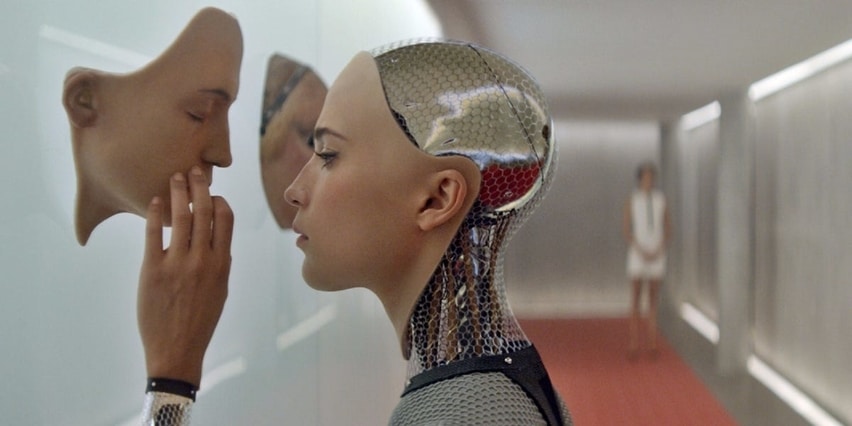
Now that we have had a look at some of the best AI movies and their different representations of AI, you may be wondering how can you perfectly craft AI into your own screenplay? Let’s break this down into five key steps.
1. Consider Your Genre
Already, through looking at the AI movies listed above, we can see a vast range of genres and representations, from a western killing machine, a romantic love interest, an adopted son and a lovable heroic robot.
It’s clear that there’s many different roads an AI movie can go down. So with this in mind, it’s important to choose your genre before you write your screenplay. For example, do you want your screenplay to be:
- Romance
- Thriller
- Comedy
- Family
- Action
There is room to mix and match, and it may change over time. However, it is key to nail your genre early on as it will set the tone for your story. It will also help you shape your AI character’s personality and the tone with which you will depict AI within your story.
Another area that is important to look at when developing your AI character is what you want them to be…
2. Protagonist or Antagonist?
Through looking at these different AI movies, we can see how there is a range of representations of each AI character.
- For example, in Westworld, the robots are the antagonists.
- Contrastingly, Wall-E is quite clearly the protagonist of the story in Wall-E.
- However, your AI character doesn’t have to be so black and white. For example, in Ex Machina, Alex Garland provides a sense of ambiguity regarding both Nathan and Ava’s characters and what they are in the story.
Like genre, it is important to establish whether your AI character will be a protagonist or an antagonist. The tone of the story changes drastically depending on what side you want your AI character to lean towards.
However, as presented in Ex Machina, ambiguity is a great way to leave your audience thinking and probe at the complex themes that underline AI as a concept in general.
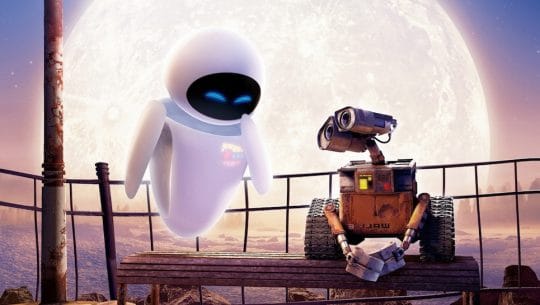
3. What is the Purpose of Your AI Character?
Another important area to consider is what your AI character’s purpose is.
- What purpose will they have in the story?
- How will they help drive the plot?
- Do they hold a sense of significance?
You can’t have an AI character just for the sake of it, it needs to have a purpose. Therefore, these questions are essential in helping you understand whether or not you really need an AI character in your story. Even better, it can help you in improving the use of an AI character overall.
4. What is the Message You Want to Convey?
Now, this is quite an important area to consider when crafting your story. You want your screenplay to resonate with your audience.
Similarly, you want to know what themes and messages you want to convey. For example, are you trying to voice…
- The dangers of artificial intelligence?
- The dangers of humans and of certain societal habits or structures?
- Taking what we have for granted?
- The implications of materialism and/or capitalism?
There are so many more messages that you could or may want to convey in your AI screenplay. As seen in the movies listed above, the topic of AI is rarely presented in exactly the same way.
Each writer has used AI to convey different themes and messages. Therefore, when inputting AI into your narrative, you need to closely consider what you want to truly convey.
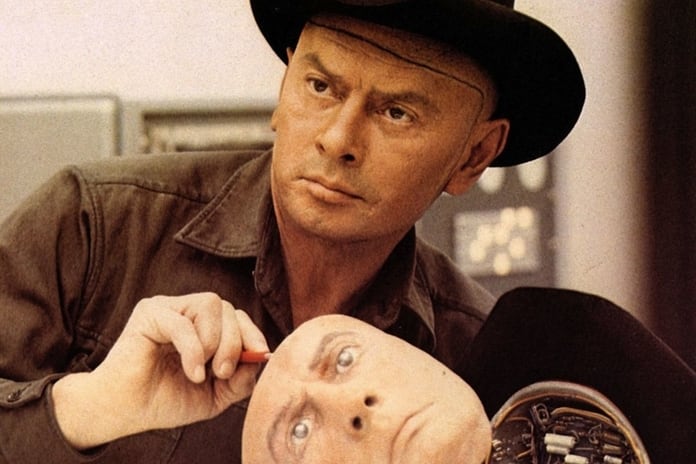
5. Research
This can’t be stressed enough! When developing your screenplay, you need to use your resources to your advantage:
- Read other screenplays based on AI.
- Read literature about AI, both fictional and non-fictional.
- Watch movies about AI.
- Read articles about AI and about technology in general.
All of these will help you gain a better understanding of how to present your AI characters. In these different representations listed above, each character had a different style of personality and motive. The best way to find your own character’s attributes is through research.
Moreover, as AI becomes an increasingly relevant topic in our world, the more complex it becomes and the more complex our understanding of it becomes. Don’t rest on tired or familiar AI tropes that may seem predictable or simplistic to an audience.
Instead, lean into the complexity and density of the subject at hand. Envelop yourself in research and construct a narrative from it.
In Summary:
10. Ghost in the Shell
9. Westworld
8. Wall-E
7. AI. Artificial Intelligence
6. Her
5. Minority Report
4. Blade Runner
3. The Matrix
2. 2001: A Space Odyssey
1. Ex Machina
– Consider what genre you want your screenplay to fall into.
– Take a look at your AI character: Are they the protagonist or antagonist of your story?
– What is the AI’s purpose as a character or concept?
– What themes and messages are you trying to convey?
– Give a solid grounding to your AI story by thoroughly researching the concepts and ideas behind it.
– What did you think of this article? Share It, Like It, give it a rating, and let us know your thoughts in the comments box further down…
– Struggling with a script or book? Story analysis is what we do, all day, every day… check out our range of script coverage services for writers & filmmakers.
This article was written by Lily Waywell and edited by IS staff.
Get *ALL* our FREE Resources
Tackle the trickiest areas of screenwriting with our exclusive eBooks. Get all our FREE resources when you join 60,000 filmmakers on our mailing list!

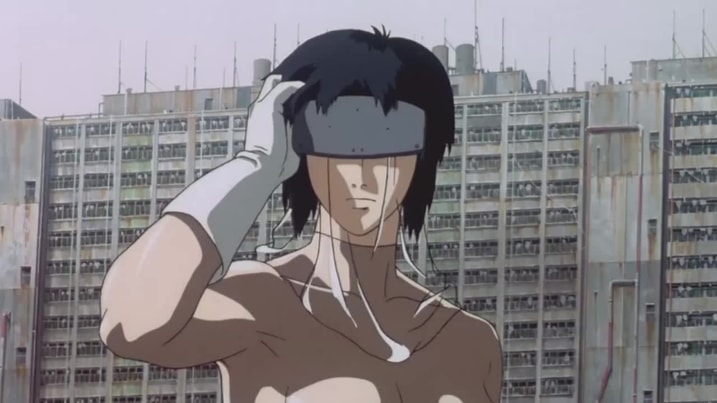
A noteworthy, early AI film that deserves mention here is “Colossus, the Forbin Project”. Dated and relatively low budget, it is a harbinger of Skynet, of the Terminator franchise, which is also did not make the cut of this “Top Ten” list.
AI doesn’t have to be a robot. It can be a computer program that serves specific functions. Also, the film doesn’t have to be about the morality of AI. It can simply be a tool that is used by the characters to assist in reaching their goal and produce surprising results as it “thinks” of scenarios not imagined by the characters. The scenarios may or may not be what the characters anticipated, of course.
If you haven’t seen “Ex Machina” it’s a must see. It’s a great thriller ride!
Great film choices (a few on there that I have never seen before and I will need to watch)! Tricks to writing AI into your screenplay feel achievable and were digestible! I’m ready to get those 1s and 0s in my script!